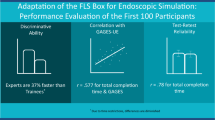Abstract
Background
Computer-based endoscopy simulators have been developed to enable trainees to learn and gain technical endoscopic skills before operating on patients. However, these simulators have not been validated as models of patient-based endoscopy. This study aimed to determine whether a computer-based simulator can accurately represent an actual esophagogastroduodenoscopy (EGD) and colonoscopy and to evaluate its ability to discriminate between varying levels of expertise in performing endoscopic procedures based on objective parameters.
Methods
In a prospective, observational trial, five first-year gastroenterology fellows and six gastroenterology attendings from a single academic center completed six endoscopy cases on the Simbionix GI Mentor II endoscopy simulator. The cases were selected to represent common clinical scenarios. The performance parameters were collected by the simulator. The 13 performance parameters measured by the endoscopy simulator were compared between the two study groups. After the simulator cases, the participants completed a survey evaluating the realism of the simulator.
Results
Novices and experts were able to complete the tasks in the simulated cases with no significant overall differences between the two groups. The computer-based simulator was able to discriminate levels of expertise only for parameters related to the time spent on the procedure (total time, time to reach the second duodenum, time to reach the cecum, and efficiency of screening). No statistically significant differences were found for the other nine performance parameters measured by the simulator. Based on the survey data, expert opinion concluded that the simulator does not offer a realistic simulation of human endoscopy.
Conclusions
The computer-based endoscopy simulator displays a lack of ability to discriminate between novices and experts in terms of endoscopic skills based on measured objective performance parameters. The findings of this study suggest that the computer-based simulator lacks fidelity and that upgrades are necessary to increase the simulator’s ability to reproduce human endoscopy more accurately.

Similar content being viewed by others
References
Sedlack RE, Kolars JC (2003) Validation of a computer-based colonoscopy simulator. Gastrointest Endosc 57:214–218
Koch AD, Buzink SN, Heemskerk J, Botden SM, Veenendaal R, Jakimowicz JJ, Schoon EJ (2008) Expert and construct validity of the Simbionix GI Mentor II endoscopy simulator for colonoscopy. Surg Endosc 22:158–162
Felsher JJ, Olesevich M, Farres H, Rosen M, Fanning A, Dunkin BJ, Marks JM (2005) Validation of a flexible endoscopy simulator. Am J Surg 189:497–500
Sedlack RE, Kolars JC (2002) Colonoscopy curriculum development and performance-based assessment criteria on a computer-based endoscopy simulator. Acad Med 77:750–751
Mahmood T, Darzi A (2003) A study to validate the colonoscopy simulator. Surg Endosc 17:1583–1589
American Society for Gastrointestinal Endoscopy (ASGE) (1999) Principles of training in gastrointestinal endoscopy (review). Gastrointest Endosc 49:845–853
Sedlack RE, Baron TH, Downing SM, Schwartz AJ (2007) Validation of a colonoscopy simulation model for skills assessment. Am J Gastroenterol 102:64–74
Ferlitsch A, Glauninger P, Gupper A, Schillinger M, Haefner M, Gangl A, Schoefl R (2002) Evaluation of a virtual endoscopy simulator for training in gastrointestinal endoscopy. Endoscopy 34:698–702
Shirai Y, Yoshida T, Shiraishi R, Okamoto T, Nakamura H, Harada T, Nishikawa J, Sakaida I (2008) Prospective randomized study on the use of a computer-based endoscopic simulator for training in esophagogastroduodenoscopy. J Gastroenterol Hepatol 23(7 Pt 1):1046–1050
Di Giulio E, Fregonese D, Casetti T, Cestari R, Chilovi F, D’Ambra G, Di Matteo G, Ficano L, Delle Fave G (2004) Training with a computer-based simulator achieves basic manual skills required for upper endoscopy: a randomized controlled trial. Gastrointest Endosc 60:196–200
Sedlack RE, Kolars JC (2004) Computer simulator training enhances the competency of gastroenterology fellows at colonoscopy: results of a pilot study. Am J Gastroenterol 99:33–37
Cohen J, Cohen SA, Vora KC, Xue X, Burdick JS, Bank S, Bini EJ, Bodenheimer H, Cerulli M, Gerdes H, Greenwald D, Gress F, Grosman I, Hawes R, Mullin G, Schnoll-Sussman F, Starpoli A, Stevens P, Tenner S, Villanueva G (2006) Multicenter, randomized, controlled trial of virtual-reality simulator training in acquisition of competency in colonoscopy. Gastrointest Endosc 64:361–368
Acknowledgments
We thank the Simulation Center of the University of Pennsylvania Health System for allowing us to use the Simbionix GI Mentor II for the purposes of this study. We also thank Josef Luba for orienting the gastroenterology fellows and attendings to the simulator.
Disclosures
Stephen Kim, Geoffrey Spencer, George A. Makar, Nuzhat A. Ahmad, David L. Jaffe, Gregory G. Ginsberg, Katherine J. Kuchenbecker, and Michael L. Kochman have no conflicts of interest or financial ties to disclose.
Author information
Authors and Affiliations
Corresponding author
Additional information
Poster presentation, Digestive Diseases Week, Chicago, IL, 1 June 2009.
Rights and permissions
About this article
Cite this article
Kim, S., Spencer, G., Makar, G.A. et al. Lack of a discriminatory function for endoscopy skills on a computer-based simulator. Surg Endosc 24, 3008–3015 (2010). https://doi.org/10.1007/s00464-010-1077-z
Received:
Accepted:
Published:
Issue Date:
DOI: https://doi.org/10.1007/s00464-010-1077-z




